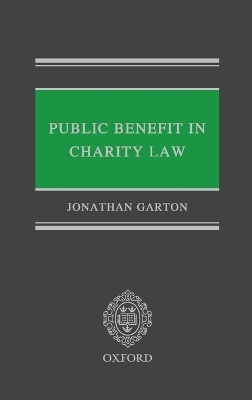
Public Benefit in Charity Law
Seiten
2013
Oxford University Press (Verlag)
978-0-19-955026-5 (ISBN)
Oxford University Press (Verlag)
978-0-19-955026-5 (ISBN)
This comprehensive analysis of the legal principles and practical applications of the public benefit test in charity law in the UK provides essential guidance on a fundamental and hotly debated area of law. It also includes comparisons with Australia, Canada, New Zealand and the Republic of Ireland.
Public Benefit in Charity Law examines the legal principles and practical applications of the public benefit test in charity law in the UK, Australia, Canada, New Zealand and the Republic of Ireland. In order to obtain charitable status, an organization must not only have exclusively charitable purpose but also demonstrate that it provides a benefit to the public.
There is a considerable body of shared case law on public benefit in these jurisdictions and yet to date there has been no comprehensive study of the topic. It is highly topical, given the many statutory reforms to public benefit in Australia, England, and Scotland, as well as the legislative reforms in Northern Ireland. In England, for instance, the Charities Act 2006 removed the presumption that some charitable purposes automatically provide a public benefit, and for the first time all charities are required to demonstrate that they satisfy the common law public benefit requirements. The impact of the reforms on independent schools and health care charities, which risk losing their charitable status if they are seen as only benefiting private individuals, attracted considerable political and media attention.
The book sets out a critical analysis of the general principles of public benefit that have developed since the emergence of the doctrine in England in the nineteenth century, and its export to the other jurisdictions. These principles are evaluated in the light of the traditional justifications for the public benefit requirement. The book also considers the practical implications of these principles in relation to specific areas of charitable activity in each jurisdictions. The analysis includes issues affecting education, health care provision, religious charities, human rights charities, political campaigning, and environmental action. Reference to other jurisdictions including the Republic of Ireland and the USA is made where such comparison is helpful.
Public Benefit in Charity Law examines the legal principles and practical applications of the public benefit test in charity law in the UK, Australia, Canada, New Zealand and the Republic of Ireland. In order to obtain charitable status, an organization must not only have exclusively charitable purpose but also demonstrate that it provides a benefit to the public.
There is a considerable body of shared case law on public benefit in these jurisdictions and yet to date there has been no comprehensive study of the topic. It is highly topical, given the many statutory reforms to public benefit in Australia, England, and Scotland, as well as the legislative reforms in Northern Ireland. In England, for instance, the Charities Act 2006 removed the presumption that some charitable purposes automatically provide a public benefit, and for the first time all charities are required to demonstrate that they satisfy the common law public benefit requirements. The impact of the reforms on independent schools and health care charities, which risk losing their charitable status if they are seen as only benefiting private individuals, attracted considerable political and media attention.
The book sets out a critical analysis of the general principles of public benefit that have developed since the emergence of the doctrine in England in the nineteenth century, and its export to the other jurisdictions. These principles are evaluated in the light of the traditional justifications for the public benefit requirement. The book also considers the practical implications of these principles in relation to specific areas of charitable activity in each jurisdictions. The analysis includes issues affecting education, health care provision, religious charities, human rights charities, political campaigning, and environmental action. Reference to other jurisdictions including the Republic of Ireland and the USA is made where such comparison is helpful.
Dr Jonathan Garton, LLB, PhD, is Reader in Law at the University of Warwick and a research specialist in voluntary sector law and policy. He has written articles on charity law and is the author of The Regulation of Organised Civil Society.
1. The Emergence of Public Benefit in Charity Law ; 2. The Elements of Public Benefit ; 3. Conceptual Public Benefit ; 4. Demonstrable Public Benefit ; 5. Cross-Sectional Public Benefit ; 6. Incidental Private Benefit ; 7. Religious Purposes ; 8. Political Purposes ; 9. Conclusion
| Verlagsort | Oxford |
|---|---|
| Sprache | englisch |
| Maße | 162 x 234 mm |
| Gewicht | 558 g |
| Themenwelt | Recht / Steuern ► Arbeits- / Sozialrecht ► Sozialrecht |
| Recht / Steuern ► EU / Internationales Recht | |
| ISBN-10 | 0-19-955026-3 / 0199550263 |
| ISBN-13 | 978-0-19-955026-5 / 9780199550265 |
| Zustand | Neuware |
| Haben Sie eine Frage zum Produkt? |
Mehr entdecken
aus dem Bereich
aus dem Bereich
meine Rechte: Wohnen, Arbeiten, Steuern, Mobilität
Buch | Softcover (2024)
C.H.Beck (Verlag)
CHF 16,65
Textausgabe mit ausführlichem Sachverzeichnis
Buch | Softcover (2024)
dtv Verlagsgesellschaft
CHF 29,25
Buch | Softcover (2024)
dtv Verlagsgesellschaft
CHF 27,85


